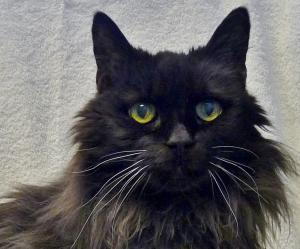Facts About Feline Infectious Peritonitis
- posted: Mar. 31, 2018
 Facts About Feline Infectious Peritonitis
Facts About Feline Infectious Peritonitis
Feline infectious peritonitis (FIP) is a frustrating disease affecting cats. FIP usually affects very young kittens less than six months of age and older senior cats. The disease is slightly more common in males. Despite many studies, the exact nuance of how this disease develops is still somewhat of a mystery. FIP is caused by a virus called a coronavirus. Coronavirus is spread in feces and cats in multi-cat households or catteries are more commonly infected. Many cats are exposed to the virus, but most do not become ill. Why?
The current theory is that in certain individuals, the virus mutates and can cause disease. The strength of an individual cat’s immunity can also play a factor in whether or not he develops FIP. The virus itself is contagious, but the disease is not as only those with mutated virus become ill.
FIP causes a variety of symptoms. Fever and lethargy are common. In “wet form” FIP, fluid builds up in the chest or abdominal cavity. In “dry form” FIP, plaques of ineffective white blood cells called macrophages form in organs like the kidney causing organ failure.
No good test exists to confirm if a cat has FIP as the presence of coronavirus does not necessarily confirm disease, and there are multiple variations in mutation of the virus making it nearly impossible to test. However, a combination of clinical signs, the presence of a highly proteinaceous, straw colored fluid in the belly or chest and recurrent, non-responsive fevers make FIP highly likely. There is no vaccine available to protect against FIP.
Because it is viral in origin, there is no treatment, and it is nearly always fatal. Treatment with prednisone or other immune-suppressing drugs may temporarily provide relief from symptoms. Anti-viral drugs like interferon have been tried but they have been largely unsuccessful. While there is currently no cure, experimental drugs show some promise in keeping FIP patients alive for extended periods of time. One is called polyprenyl immunostimulent. It bolsters the cat’s own immune defenses against FIP and has shown some promise in treating the dry form. Another is 3C-like protease inhibitor. A very small study involving about 20 cats has shown that it may extend the lifespan and cause remission in young kittens with wet form FIP. Investigation of the usefulness of these therapies is ongoing and they are not yet commercially available for treatment.
While FIP affects only a small number of cats, it is difficult to prevent, diagnose and treat and is nearly always fatal. New treatments are on the horizon so hopefully veterinarians will have a new arsenal in their corner to deal with this devastating disease in the coming years.
This blog brought to you by the Patton Veterinary Hospital serving Red Lion, York and the surrounding communities.
Sources: https://www.veterinarypartner.com/Content.plx?P=A&S=0&C=0&A=681
http://www.eventscribe.com/uploads/eventScribe/PDFs/2018/4580/551706.pdf (FIP: Where We Stand with Diagnosis and Treatment. Susan Little, DVM, DABVP. Western Veterinary Conference, March 5, 2018.)
Location
Patton Veterinary Hospital
425 E Broadway
Red Lion, PA 17356
